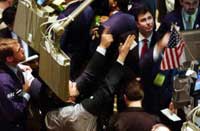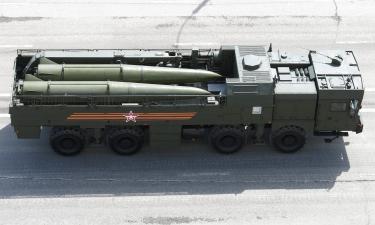Chinese stock prices plunge nearly 9 percent, biggest drop in a decade
Chinese stocks plunged nearly 9 percent Shanghai's benchmark stock index plunged nearly 9 percent on Tuesday, its biggest drop in more than 10 years, sending ripples through other markets from Hong Kong to Australia.

Investors who had just lifted the market to a record Monday unloaded stocks to lock in profits and amid speculation about a fresh round of austerity measure from the Chinese government to slow sizzling economic growth.
Chinese stocks have been extremely volatile this year, notching one-day drops of 4.9 percent and 3.7 percent already this year and each time the market has bounced back to record highs.
The Shanghai Composite Index tumbled 8.8 percent to close at 2.771.79, its biggest single-day decline since it fell 8.9 percent on Feb. 18, 1997, at the time of the death of Communist Party elder Deng Xiaoping. The index had gained 1.4 percent on Monday to a record 3,040.60.
The Shenzhen Composite Index on China's smaller exchange plummeted 8.54 percent Tuesday to 709.81.
Chinese share prices doubled last year as investors piled into the market following the completion of shareholding reforms that helped to reduce worries over a potential flood of shares entering the market.
But the markets have become increasingly volatile.
Market heavyweights plunged Tuesday on heavy selling by institutional investors, which in turn spooked retail investors.
"The most important reason for today's decline was pressure for profit-taking," said Peng Yunliang, a senior analyst at Shanghai Securities.
"People viewed 3,000 as a psychological benchmark. It's understandable they might want to pull back after the market hit that peak," Peng said.
Large-cap Baoshan Iron & Steel hit the 10 percent downside limit at 9.03 yuan, CITIC Securities fell 9.7 percent to 36.21 and China Life Insurance declined 9 percent to 33.89 yuan.
Airline shares were battered after light, sweet crude for April delivery gained a cent to US$61.40 a barrel, a two-month high, on the New York Mercantile Exchange, reports AP.
Air China slid 10 percent to 6.79 yuan and China Southern Airlines lost 5 percent to 5.81 yuan.
China still limits foreigners' purchases of the yuan-denominated stocks that make up the biggest share of the markets, though that is gradually changing as regulators allow increasing participation by so-called qualified foreign institutional investors.
Subscribe to Pravda.Ru Telegram channel, Facebook, RSS!




